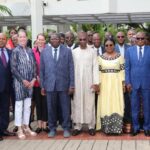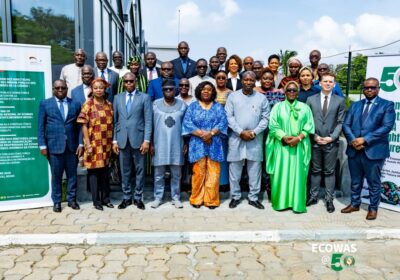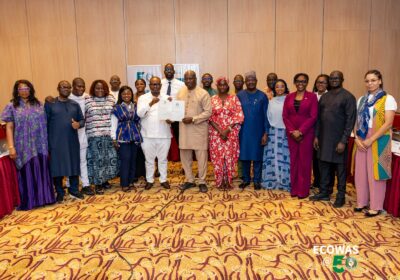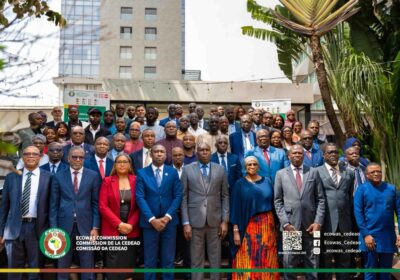Cyber Security Agenda Takes Center Stage As ECOWAS Convenes Regional Digital Resilience, Cooperation By Raymond Enoch
I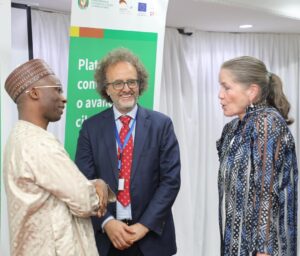
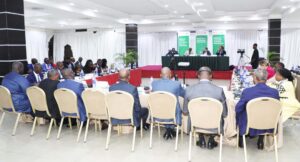 n a decisive move that signals a turning point for digital governance in West Africa, the Economic Community of West African States (ECOWAS) convened a high-level briefing on Cyber Diplomacy for its Permanent Representatives Committee (PRC) in Abuja.
n a decisive move that signals a turning point for digital governance in West Africa, the Economic Community of West African States (ECOWAS) convened a high-level briefing on Cyber Diplomacy for its Permanent Representatives Committee (PRC) in Abuja.
The landmark event, co-hosted by the Delegation of the European Union to Nigeria and ECOWAS alongside the German Federal Foreign Office, marks a pivotal step in advancing regional cyber resilience and asserting West Africa’s voice in global digital negotiations.
Once a peripheral topic in security discourse, cyber diplomacy has swiftly become a core strategic concern as digital infrastructure expands and cross-border threats proliferate. With this reality in focus, ECOWAS is staking its claim as both a thought leader and decision-maker in international digital policy.
“Cyber diplomacy is no longer optional. It is essential,” declared H.E. Mr. Sédiko Douka, ECOWAS Commissioner for Infrastructure, Energy and Digitalisation, in a powerful opening address. “It allows us to defend our digital sovereignty, build trust among Member States, and shape the rules that will govern cyberspace — both in Africa and globally.”
Representatives from ECOWAS Member States, the European Union, Germany, and various multilateral and technical organizations gathered to chart a cohesive regional path forward. The aim: to ensure that West Africa does not merely respond to the global digital order, but actively co-authors it.
Speaking on behalf of the European Union, Mr. Massimo De Luca, Head of Cooperation, reinforced the bloc’s commitment to a secure and inclusive digital landscape in the region.
“Our cooperation on cybersecurity is not only about technical capacity — it is about protecting citizens, businesses, and the democratic space. ECOWAS is leading by example,” he emphasized.
Echoing this sentiment, German Ambassador to Nigeria and ECOWAS, H.E. Annett Günther, underscored the importance of regional unity in setting global norms. “The future of diplomacy is already digital,” she said. “ECOWAS can set an example of how regional blocs shape responsible behaviour in cyberspace.”
Representing the political will of Member States, H.E. Ambassador Musa Sani Nuhu, Permanent Representative of Nigeria to ECOWAS and Chair of the PRC, called for a proactive and united diplomatic front.
“We must be present in international discussions that affect our digital future,” he said. “ECOWAS has the collective voice, the political will, and the legitimacy to act as one. Let’s use it.”
Further adding to the strategic depth of the conversation, H.E. Ambassador Maria Adebahr, Cyber Ambassador for the German Federal Foreign Office, emphasized the need for coherent policy frameworks and skilled diplomacy.
“Cybersecurity, artificial intelligence, and emerging technologies must be met with diplomatic skill, policy coherence, and regional unity,” she noted. “ECOWAS has shown it is ready to lead.”
In the technical sessions that followed, Ms. Sorina Teleanu of DiploFoundation unpacked entry points into multilateral digital governance, citing ECOWAS’ critical stake in processes like the UN Open-Ended Working Group and the Global Digital Compact.
Contributions from Mr. Moctar Yedaly (Africa Regional Director, GFCE), Dr. Katherine Getao (former ICT Secretary of Kenya), and regional cyber experts including Dr. Nnenna Ifeanyi-Ajufo, Mr. Abdul-Hakeem Ajijola, and Mr. Vladimir Radunović highlighted the urgent need for legal reform, cross-sector collaboration, and operationalisation of ECOWAS’ cybersecurity directive adopted in December 2023.
Their consensus: cybersecurity must be treated not merely as a technical issue, but as a fundamental pillar of sovereignty, stability, and development.
As the briefing concluded, a unified call emerged — cyber diplomacy is not a luxury for digitally advanced economies, but a necessity for regions determined to shape their future. ECOWAS, backed by strong partnerships with the EU and Germany, is making it clear that West Africa is ready to lead in defining the norms, protections, and cooperative frameworks that will govern the global digital order.
This high-level engagement is part of ECOWAS’ broader strategy to integrate digital governance, regional security, and multilateral diplomacy into its core mandate. As cyber threats grow in complexity, so too does the resolve of West Africa’s leading regional bloc to meet them — not defensively, but diplomatically and decisively.




